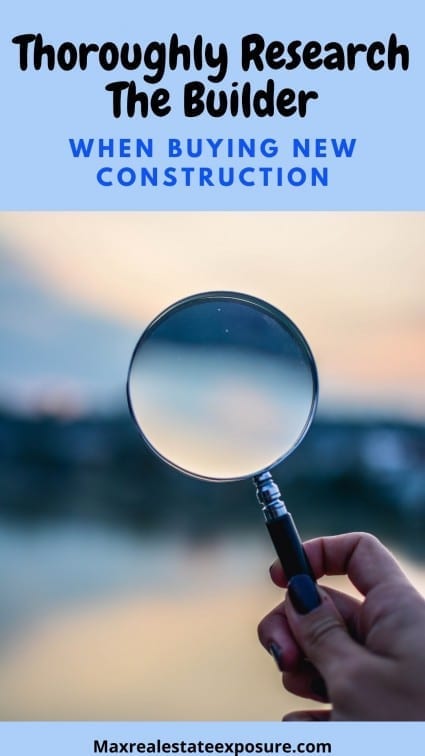What to Know About Buying New Construction Homes
 Are you thinking about buying a new construction home? The idea of purchasing a brand-new house is appealing to many homebuyers. Going directly to the builder and being the first to live in a home offers advantages.
Are you thinking about buying a new construction home? The idea of purchasing a brand-new house is appealing to many homebuyers. Going directly to the builder and being the first to live in a home offers advantages.
However, buying a newly constructed home isn’t the same as buying from a homeowner.
With a new construction home, some similarities exist to buying resale or even older homes. But there are also many differences that you need to consider before you buy a new build.
A lot is at stake when you buy any home, and it is a financial decision that can affect your life for decades.
It is, therefore, understandable that the prospect of buying a new home is daunting to many. The more you understand and learn about the process, the easier it becomes.
To help new construction home buying, we have put together a guide that will explain the process, including:
- Steps to buying new construction
- Researching the home builder
- Types of new construction homes
- Building custom vs. semi-custom
- Choosing a new construction mortgage company
- The benefits of having a buyers agent
- Researching the community
- Negotiating the price
- The searches you need to do
- Getting new construction guarantees
- Understanding the builder’s warranty
- Questions to ask a home builder
- Why a home inspection is important
- Doing the final walk-through
- Finding new construction homes for sale
- What to know about the builder deposits
- The pros and cons of new construction homes
Buying new housing means purchasing directly from the builder, often before the home construction starts. This brings a few more challenges than a property you buy from a homeowner.
The builder is operating their business to profit from the homes they build. They are looking to sell their houses to move on to other projects. Understanding the situation from the builder’s perspective can help you plan your home-buying approach.
But before you make an offer on a new home, you should ensure you understand the new construction home-buying process.
Let’s consider everything you need to know about buying a new house.
Understanding The New Construction Home Buying Process
While there are many similarities between buying new construction and any other home, there are some crucial differences. You must know the differences to avoid a costly mistake when buying your next home.
Working with the right professionals, real estate agents, and lenders is vital when buying new construction homes. This will help you create the right plan to buy your new house, ensuring you don’t spend thousands of dollars more than you need to.
An experienced Realtor will help you find the right community and house, but there are many things that you should research yourself. This will help you avoid a costly mistake or living in a subdivision you aren’t thrilled with.
Thoroughly Research The Builder When Buying a New House
 Doing ample due diligence researching the builder before committing is an excellent idea. One of the essential things is feeling confident the builder will deliver as promised.
Doing ample due diligence researching the builder before committing is an excellent idea. One of the essential things is feeling confident the builder will deliver as promised.
Make sure you spend the time speaking to a few past customers to get their feedback on their experience. Check with the Better Business Bureau to ensure no complaints or bad press about the builder.
Check if they are a member of The National Association of Home Builders, a well-respected organization.
Do a Google search to see if you find any negative news. Nothing is more disastrous in real estate than getting involved with an awful home builder.
Understand The Types of New Construction Homes
Many potential new construction home buyers get confused about why some properties are more expensive. The price per square foot can vary tremendously in new homes.
The reason for this is a simple explanation. There are essentially a few different types of new construction homes. They fall into a few categories: tract homes, spec homes, and custom homes. Let’s cover each.
Tract Homes
A tract home is new construction that is part of a large-scale development. Developers frequently purchase significant areas of land to create neighborhoods from scratch.
These houses are sometimes known as cookie-cutter homes because they tend to resemble one another. Buyers who typically purchase tract homes aren’t concerned with the significant duplication.
Tract homes are usually less expensive than spec homes or custom builds.
Spec Homes
A spec home is a property delivered by a builder, finished, and ready for occupancy. It is a new house that nobody has lived in yet. You will not have any say in what materials were utilized during construction,
Spec homes are an excellent option when you want the never-been-used thrill of a new property but don’t have several months to wait for a house to be built from scratch.
Custom Homes
A custom house offers total flexibility, allowing you to dictate every aspect of its construction. From choosing a suitable layout to determining all the finishes, you are deciding how you want the home built.
Custom residences are typically the most costly for entering new construction, but this is the optimal route if you’ve ever dreamt of designing a masterpiece from scratch.
Luxury Homes
In the luxury end of the market builders will construct McMansions that cater to the upper middle class. These are huge houses that are often rubber stamped in many neighborhoods, especially those of national builders.
They are called McMansions as an analogy to McDonald’s which is famous for pumping out tons of mass produced food daily. Many pundits see McMansions the same way.
A McMansion should not be confused with a Mansion which is the pinnacle of housing reserved for the ultra rich.
Buying a Custom House vs. a Semi-Custom Home
When buying new construction, it’s possible to build a home from scratch, consider a custom new build, or buy the builder’s spec home. With spec homes, it’s possible to come along and purchase at various stages of construction.
The advantage of a custom house is that you can choose everything that goes into it, from the type of kitchen, paint colors, granite countertops, and light fixtures.
You can choose the architectural design and your desired floor plan with many custom home builders.
The customization options can be endless when building a custom home. The building process is a bit less rigorous when purchasing a spec home because many selections have already been made.
An important step will be determining whether you want to build from scratch.
Working With a New Construction Lender
With any new home purchase, finding the right mortgage is essential. The difference between the right home loan and, for that matter, the right mortgage lender could mean thousands of dollars to you.
When buying new construction, the first thing to find out is who will do the financing. Will you get an end loan from a traditional lender, or will the builder require you to get your new construction loan? If the answer is yes, it will be vital to determine why the builder is having you take out the construction loan. Do they have a financial problem that requires them to do so?
If it is the former, is there a builder’s preferred lender? Sometimes, with a new construction purchase, the builder will have special financing incentives to use their mortgage lender. For example, there may be reduced closing costs.
It will be crucial to understand the financing options from the get-go. The builder’s lender may offer the best deal with the lowest interest rates.
Do Your Own Mortgage Research When Buying New Construction
When using your lender, it is crucial to research to find what options are available to you from multiple mortgage companies. As many as three or more is ideal for ensuring you get the best deal possible when buying a new construction home.
It would help if you didn’t avoid this critical stage since you could spend tens of thousands more than needed. A fraction of a percentage difference in the interest rates charged can add massively to the cost of your home loan over 20 or 30 years. Go with the best option you can find.
Keep in mind if you put less than 20 percent down on a conventional loan, you will be paying PMI.
Once you have a lender, you need a real estate agent to work on your behalf. You want to make the right choice here.
Should You Use a Buyer’s Agent When Buying a New Construction Home?
 The builder will pay your agent’s commission, so why wouldn’t you get the help of an experienced professional? They will focus on your best interests and ensure you get the best deal on the new house.
The builder will pay your agent’s commission, so why wouldn’t you get the help of an experienced professional? They will focus on your best interests and ensure you get the best deal on the new house.
An experienced buyer’s agent will handle complex negotiations, removing much of the stress from buying a new construction home.
You want an excellent agent on your team with whom you feel you can work. Ideally, you should find an agent that is transparent with the information they pass on.
You will benefit from an agent willing to tell you the truth, even if it is something you don’t want to hear.
You also want your agent to be happy to explain every stage of the new constructiohome-buyingng process to you.
If you don’t understand something happening, you should feel confident to approach them and ask.
Going directly to the builder’s representative is not wise, as they REPRESENT the builder, NOT you!
Here are all the reasons to have a buyer’s agent when purchasing new construction.
Once you have a buyer’s agent you feel you can work well with, you need a plan.
- What are you looking for in new construction?
- Are there must-haves you need?
- What features would you like but aren’t a deal-breaker?
If you clearly understand the home you are looking for, you will stand a better chance of getting a home you’ll love living in for many years.
Searching for a new construction home isn’t the same as finding a property that has already been lived in. You often won’t have photos of the house as it hasn’t been built yet. Because of that, the next stage becomes all the more critical.
Remember That Researching The Builder is a Key Part of The Process
While it might not be the most exciting thing you can do, researching your builders before using them for your new construction can pay off. Ensure you read the questions to ask a builder I have provided above.
Doing this sort of research doesn’t have to be difficult either. A simple search for “best new construction builders” and then the name of your area is an easy starting point. You can also do similar searches to find the best new home communities in the area.
When you find new developments that interest you, you can still do more research. Without too much difficulty, you should be able to find online reviews for the development and related news.
You can even contact residents to get more information on the development. Using social media in this way should allow you to connect with people currently living in the development and willing to give you details on the community. All of this will provide you with a better understanding of whether this is the right neighborhood for you and your family.
An excellent real estate agent will help you find the right community since they will know the area better. They can locate homes that meet your criteria in the right places.
You might have to be shown quite a few homes before you find one that ticks all your boxes. But when you see the home you want to buy, you need to find a deal you want to agree to.
The Future of the Community Matters
 When choosing where you want to live, the prospects for the neighborhood should be considered. Is the area heading in the right direction?
When choosing where you want to live, the prospects for the neighborhood should be considered. Is the area heading in the right direction?
While this can be difficult to assess, you should consider safeguarding your home’s value.
- Does the area have the amenities you need?
- Are businesses moving into commercial areas nearby, or are things heading in the opposite direction?
- Checking the crime rate can also show if things are improving.
- What are the builder’s plans for the development?
- Will there be an HOA for the neighborhood?
- Are there going to be protective covenants in place for the properties being built?
Weighing these factors should give you a better understanding of where the community will likely be.
A better and more desirable community will improve the ease and price you get for your home when you sell. But before that, it will give you and your family a better living experience.
Will There Be Restrictive Covenants You Can Live With?
It is essential to determine if there are restrictive covenants when buying a new construction home. If so, what are they, and can you deal with them?
Specific house covenants could be a deal breaker. For example, you may want to build a particular home of size that is not permitted.
It is vital to look over the restrictive covenants before moving forward.
Can You Negotiate The Price of a New House?
As with most things in the new construction home-buying process, the price canhome-buyingy be negotiated depending on the local housing market. However, if the builder is constructing many properties in the development, the chances of you getting a lower price could be minimal.
If you are one of the first buyers in the development, you will stand a better chance of a discount on the base price. The first person usually gets the best deal as it puts the project on its way.
Once the first few homes have been sold in the development, the other houses will undoubtedly be priced higher.
It is more difficult for the builder to sell the first few properties if no one else has purchased them, so they are more open to negotiation.
One thing to understand about the new construction process is that builders rarely cut their prices. You will be much more likely to ask for a few extras included in the sale than to get a price reduction.
Giving financial incentives such as a few extras is better for the builder because other buyers expect the same thing once a dropped price becomes public,.
Getting The Best Price on a New Construction Home
This is where having an experienced real estate agent on your team will pay dividends. They will understand what needs to be done to get you the best deal on the property.
While you could assume that not having a buyer’s agent could get you a lower price, builders rarely move on price. Instead, having a professional on your side to negotiate for you should secure the best possible terms.
The best deal on a new home doesn’t always mean a lower price. With new construction, builder’s upgrades can increase the value to the buyer more than a reduction in price will. Maybe there is something in the model home you want?
Often, builders won’t want to budge on price because it will affect the neighborhood’s value. If they build many more homes in the development, any price reduction could harm future profits.
However, upgrades to the new house won’t have the same negative effect on the price point in the area. Not dropping the sales price will also avoid upsetting neighbors who have already purchased homes nearby.
Holding Builders to Their Promises
If you’ve researched, you should work with a reliable builder. However, it would be best to make sure any promises or agreements you reach with your builder are written down. Getting things in writing prevents misunderstandings or mistakes and ensures things aren’t forgotten.
Verbal assurances, unfortunately, don’t guarantee anything and aren’t binding. If you are working with an experienced real estate agent, this shouldn’t be a problem with agreements signed.
You Aren’t Buying the Model Home
 While you might be shown a model home on the development, remember that this will likely contain all the upgrades and best amenities available.
While you might be shown a model home on the development, remember that this will likely contain all the upgrades and best amenities available.
You need to know what the new construction home you buy contains and doesn’t.
The model home the builder uses to sell new homes will be fully upgraded to attract buyers better.
You aren’t being shown the base model of what the builder offers; if you want the features found in the model home, you will have to pay more.
Write down the things you like about the model home to ensure that this is factored into the price offered by the builder and your negotiations.
If you like the colors in the model home, write that down, too. Do you love the granite countertops? Make a note of them.
There will be many things that can be customized during the home’s construction, though there are limitations to this.
The more changes you want to make and the more features you add, the overall cost of the home will increase. So, if you want a new feature added, ensure you know how much it will add to the price.
Getting Guarantees on Your New Construction Home
With new constructions, it is crucial to get guarantees. Since the home doesn’t currently exist, you need to have guarantees in writing from your builder.
These guarantees should include things like the completion date of the construction.
There should be a set of specifications outlining precisely what is included. This is important to ensure no gaps in your living arrangements.
The purchase and sale agreement should include your home’s floor plan and elevations.
These are standard items in builder contracts, especially with different floor plans and options. However, getting guarantees on your new house isn’t the same as a home warranty.
New House Warranties Are Essential For Buying a Newly Constructed Home
If you are happy with everything so far and ready to buy, the builder’s warranty is still the issue. The builder might have their home warranty, or it could be provided through another company, but whatever the case, you want to be clear on the details.
The builder warranty will spell out precisely what they must do when repairing and maintaining.
You need to understand what the warranty covers and what it doesn’t. If you aren’t satisfied with what the warranty offers, it could be possible to negotiate on the details. Your Realtor should help with this so that you get the coverage you believe necessary.
Builder warranties are standard for a new construction house and something you should expect. Most of them will cover your home for at least a year. Some of the National builders will be for much longer.
Are Home Inspections Needed With New Construction?
One question that gets asked many times when buying new construction is whether a home inspection is necessary.
Even if you trust the reliability of your builder, mistakes can still be made. Though the builder must follow the building code during construction, there can still be issues.
Having a home inspector come in ensures the builder hasn’t forgotten things or made mistakes. This can save you potential headaches and is worth the initial expense.
Home buying is usually the most significant financial decision, so you want to ensure it is up to the standard you expect. The home inspector will review the work carried out by the builder, giving you a report on their findings.
If the inspector finds some things that need to be addressed, you can go back to the builder to have them fix the issue. Your Realtor can advise you on whether the items found by the inspector are worth bringing up with the builder.
Some things in the report might be minor, whereas others could be essential and must be handled before closing.
However, don’t expect a builder to let you have a contingency for a home inspection as you would find with a resale home. Builders will not build a custom home, allowing you to walk from the sale.
The Final Walk-Through When Buying New Construction is a Crucial Step
You will also need to complete a final walk-through before you sign the documents at closing. This will be shortly before closing, so you need to walk through to have your last check for the home.
The final walk-through will generate a punch list to give to the builder for any unfinished items. Quite often, there will be towalk-throughing that needs to be done and other minor issues.
If something is more significant, you may request your attorney to hold back the builder’s funds until the work is completed. Doing so will give them the incentive to complete the project promptly.
An escrow holdback will allow you to close and incentivize the builder to complete the unfinished work.
There are many details to review, so ensure you do a thorough job. Your attorney will also request a copy of the occupancy certificate to ensure the city or town has signed off on everything.
The Final Walk-through is an Important Step in The New Construction Process to Discover Any Potential Problems Before Moving In.Click To TweetHow to Find New Construction Homes Near Me
The best way of finding new construction homes is to establish a relationship with a top local Realtor who knows new construction. However, if you are new to the area and want to find some new construction developments, you can try searching for new construction homes near me or new construction houses for sale near me.
You should see a few results of local developments.
What is The Down Payment For a New Construction Home?
Over my thirty-seven years of selling new construction homes, one of the questions asked most often is how much you need to put down for a builder’s deposit.
While resale homes have an earnest money deposit, the builder will require a deposit to secure the home before closing. Typically, you can expect to need 5% to 10% of the purchase price for the builder’s deposit.
Like many things in the buying process, this can be negotiated. So, if this deposit size is too large, ask the builder for a reduction. It doesn’t hurt to ask; if the builder is more motivated to sell, you will be more likely to reduce the deposit.
More importantly, you want to determine if the builder will use your money or hold the funds in an escrow account. If the builder plans to use the money, consulting a real estate attorney would be wise first. You want to make sure the builder is financially sound.
Do New Construction Homes Make a Good Investment?
While your most significant consideration when buying a home should be where you want your family to live, it doesn’t hurt to consider future resale value. New homes can appreciate faster than older ones since buyers often prefer newer construction.
Pros and Cons of New Home Construction
Let’s review the pros and cons of buying new construction.
Pros of New Homes
- Built to today’s standards.
- You can customize and personalize the way you want your home.
- Modern floor plans to choose from.
- Amenities not found in resale homes.
- Picking your lot location.
- No updates will be necessary.
- The home will be spotless upon moving in.
- Energy efficiency will be superior to a resale home.
- There will be less maintenance.
- You will have a builder’s warranty for items needing repair.
Cons of New Homes
- New construction homes are more expensive.
- Limited ability to negotiate on price.
- Some builders have limited options.
- Expensive to personalize.
- You could have a new home “smell” for a while that’s not enjoyable.
- It takes longer to move into your home on many occasions.
- You may deal with restrictive covenants from an HOA.
- Landscaping will be less mature.
- You will likely be paying higher taxes.
Questions to Ask a Builder Before Buying New Homes
 As mentioned, check out the reference to all the questions to ask when buying new construction. Here are a few more that are worth exploring.
As mentioned, check out the reference to all the questions to ask when buying new construction. Here are a few more that are worth exploring.
1. How often do you miss your delivery dates?
When you have a current home to sell and are trying to time the closing to be in the neighborhood with the conclusion of the new build, it can be disheartening to find out the builder won’t deliver as promised.
One of the most common questions new construction buyers ask is the builder’s track record for closing on time.
The period to build the home should be realistic. Builders with years of experience tend to be more accurate with delivering on time.
For years, I represented a builder in Milford, Massachusetts, who became notorious for always missing his closing dates.
As you might imagine, this hurt his reputation as a builder.
2. Do you provide energy efficiency features?
One of the most popular features today in new builds is energy efficiency. Most well-built homes will have energy-saving materials, including appliances, heating and cooling, beefed-up insulation, Energy Star windows, and others.
It is more unusual today not to see multiple energy-saving features in a new house.
3. Are extras paid upfront or at the closing?
This is an essential question, as different builders don’t have the same policy. Some make you pay all extras immediately.
Others will ask you to pay for half the cost, and others will let you pay at closing. This could be an essential factor when it comes to budgeting properly.
Wrapping Up Buying New Construction
While many things you need to consider when buying newly constructed homes are similar to purchasing from a homeowner, there are extra and different issues.
Negotiations are one area that is going to be different with new construction. You will also need to check out your builder to ensure they provide the service you expect when buying a new home. The neighborhood is another factor you must research before committing to buying your home.
If you take care of these factors and the other issues we’ve highlighted, you should have a more successful homebuying experience. Your newly constructed home can become a place filled with happy memories for you and your family.
Hopefully, you have found these thome-buyinging new construction to be valuable. You’ll be in a much better position by following these dos and don’ts of buying new construction.
Please contact me if you plan to buy a new home in my area and need assistance.
About the Author: The above Real Estate information on tips for new construction home buying was provided by Bill Gassett, a Nationally recognized leader in his field. Bill has expertise in mortgages, financing, moving, home improvement, and general real estate.
Learn more about Bill Gassett and the publications he has been featured in. Bill can be reached via email at billgassett@remaxexec.com or by phone at 508-625-0191. Bill has helped people move in and out of Metrowest towns for the last 37+ years.
Are you thinking of selling your home? I am passionate about real estate and love sharing my marketing expertise!
I service Real Estate Sales in the following Metrowest MA towns: Ashland, Bellingham, Douglas, Framingham, Franklin, Grafton, Holliston, Hopkinton, Hopedale, Medway, Mendon, Milford, Millbury, Millville, Natick, Northborough, Northbridge, Shrewsbury, Southborough, Sutton, Wayland, Westborough, Whitinsville, Worcester, Upton, and Uxbridge MA.

